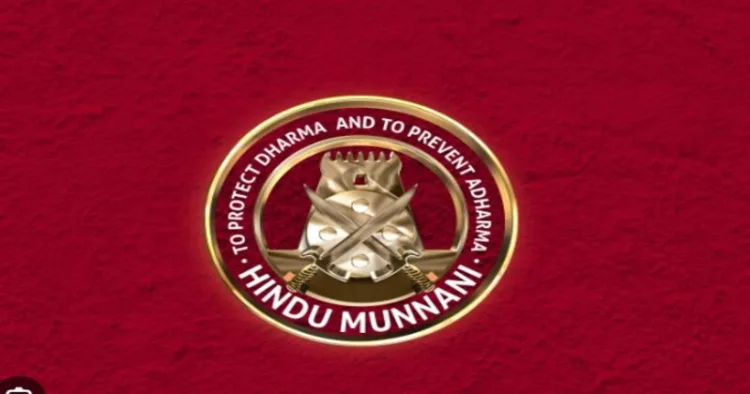The Hindu Munnani executive council, in its latest meeting, strongly condemned the panel report by retired High Court Judge K Chandru, which recommends banning the display of religious symbols in schools. The council’s resolution was part of a series of 16 adopted during the Tamil Nadu-Puducherry state executive council meeting held on June 29 and 30 in Karaikkal, Puducherry.
The meeting, held in a private marriage hall, was presided over by state president Kadeswara C Subramaniam, who lit the ceremonial lamp to inaugurate the event. Other prominent attendees included Dakshina Bharat organiser K Bakthaan, state organiser S Rajesh, joint KK Ponnaiah, state general secretaries N Muruganandam, C Parameswaran, JS Kishor, and several vice presidents, treasurers, and council members.
One of the key resolutions passed condemned the recommendations of Justice Chandru’s panel. The panel had suggested measures aimed at preventing caste clashes in schools, including a ban on students wearing coloured wristbands, rings, and traditional forehead marks that may indicate their caste. Additionally, the report recommended removing caste appellations in the names of schools and enforcing caste-based reservations in higher secondary education to ensure access for Scheduled Caste (SC) students.
The Hindu Munnani criticized these suggestions as being one-sided and anti-Hindu. They argued that the recommendations were not addressing the real issues faced by students but were instead aimed at banning Hindu customs and distorting the histories of real fighters and patriots. The executive council accused the panel of pushing an agenda aligned with Dravidian, Communist, and Missionary groups, which they claim threatens communal harmony and promotes religious conversions.
In their detailed review of the panel’s recommendations, the council expressed regret that such suggestions were being promoted in Tamil Nadu, a state known for its spiritual heritage and numerous temples. The Hindu Munnani urged the DMK government to reject the recommendations, asserting that they were designed to undermine Hindu traditions and practices.
The resolution stated, “We strongly condemn the panel reports of retired High Court Judge K Chandru. In the guise of preventing caste clashes in schools, the report suggested measures that are one-sided and anti-Hindu in nature. These include banning coloured wristbands (Kalawa), rings, and traditional forehead marks (Tilak) worn by students, ostensibly to eliminate caste distinctions in schools. Justice Chandru has also advocated for the enforcement of caste-based reservations in higher secondary education, emphasizing access for Scheduled Caste (SC) students.”
Condemnation of the Kallakurichi Hooch Tragedy
One of the primary resolutions condemned the state government’s response to the Kallakurichi hooch tragedy, which claimed over 60 lives. The council criticized the government’s negligence, stating that the value of human life has been reduced to mere monetary compensation. The resolution questioned whether Tamil lives are deemed cheaper and warned that if the current attitude persists, the state will deviate from its path of progress.
The Hindu Munnani highlighted that TASMAC outlets, run by the government, are primarily responsible for the widespread liquor addiction among the poor and youth, destroying futures. The council noted that the DMK government had not learned from previous illicit liquor tragedies in Marakkanam and Chengalpattu. The ease with which illicit liquor was sold near government offices in Kallakurichi, even after the deaths, was termed shameful.
Call for Prohibition and Rehabilitation
The resolution called for the introduction of prohibition in Tamil Nadu, similar to the dry law in Bihar, which has reportedly benefited economically. It urged the government to shut down liquor production units and establish more de-addiction and rehabilitation centres instead of increasing TASMAC outlets. The council demanded genuine action against those responsible, including politicians, intelligence personnel, and revenue officials, rather than superficial measures against district collectors and police superintendents.
Liquor Sales Near Temples in Puducherry
Another resolution demanded the Puducherry government to immediately close liquor shops located near temples and public properties, ensuring the sanctity and safety of these areas.
Rejection of Anti-Hindu Educational Content
The council called for the removal of anti-Hindu and irrelevant content from the state syllabus, arguing that such materials do not contribute to the welfare and future needs of students. They appreciated the NCERT for removing lessons on Babar from history books, stating that Mughal invaders who looted temple wealth should not be glorified in educational materials.
Family Planning and Population Control
One resolution demanded compulsory family planning across all regions and communities to control the Muslim population growth, which has increased from 9% in 1950 to 14% now.
Freeing Temples from Naxal Influence
The pitiable condition of Hindu temples in the state was another concern, with the council calling for temples to be freed from Naxal influence and control.
Praise for PM Modi and Court Orders
The council lauded Prime Minister Narendra Modi for equalling Jawaharlal Nehru’s record of serving as Prime Minister for three consecutive terms. Another resolution condemned the state government for not respecting court orders regarding the demolition of an illegal mosque in Koyambedu. Despite Supreme Court and High Court orders, the DMK government has allegedly attempted to allow the mosque to remain, with Chief Minister Stalin directing officials not to demolish it. The resolution criticized the special privileges and subsidies given to places of worship belonging to minority communities.
Narcotic Drug Sale
The Hindu Munnani also raised concerns about the prevalence of narcotic drug sales in the state, including ganja, ganja-laced chocolates, liquor, and synthetic drugs, which are freely available and affecting youths and students unchecked.
These resolutions reflect the Hindu Munnani’s ongoing efforts to address various social and political issues in Tamil Nadu and Puducherry, emphasizing the need for government accountability and preservation of cultural values.



















Comments